LGBT History Month was founded by a Missouri educator in 1994. Here's his story.
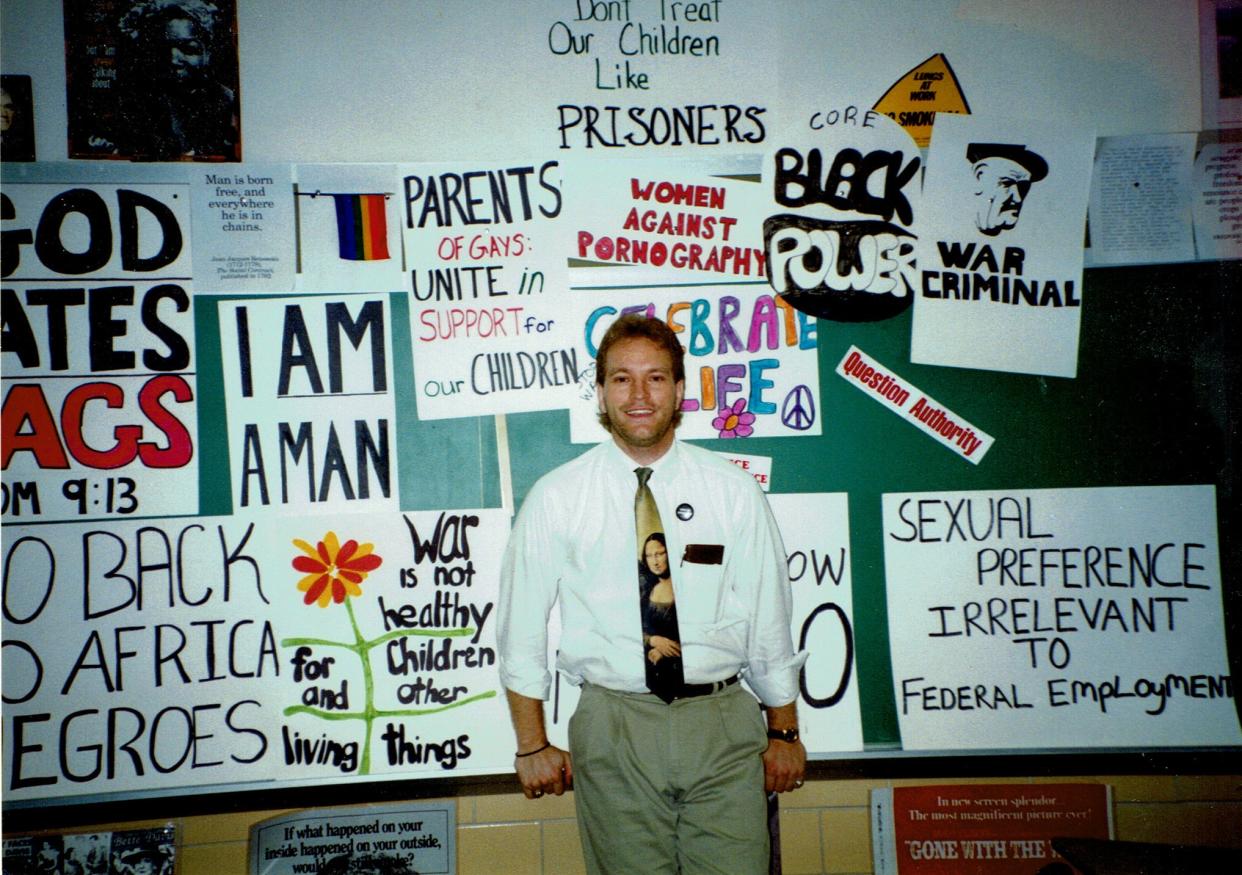
- Oops!Something went wrong.Please try again later.
Growing up gay in rural Potosi, Missouri during the 1960-70s, Rodney Wilson wasn't sure where he fit.
"Queer people existed in the shadows," Wilson said. "That area of the world, that area of our country ... there was not space for them (the LGBTQ community).
"I didn't know any other people in Potosi who were lesbian or gay. We didn't even talk about bisexual or transgender in the 1970s. I was alone, I felt."
Wilson recalled understanding that he was gay at eight-years-old. At the time, living in Potosi — located about 72 miles southwest of St. Louis with a population around 2,500 — he didn't have a community to turn to.
Nonetheless, about 20 years later, Wilson was busy developing LGBT History Month, a month-long observance of the community's history, including its hardships, achievements and relation to other civil rights movements. What started as sending letters in the mail, asking for endorsements from national organizations, has now blossomed into a multi-cultural celebration of the community throughout the United States and other countries around the globe. LGBT History Month has been celebrated each October in the U.S. since its founding in 1994.
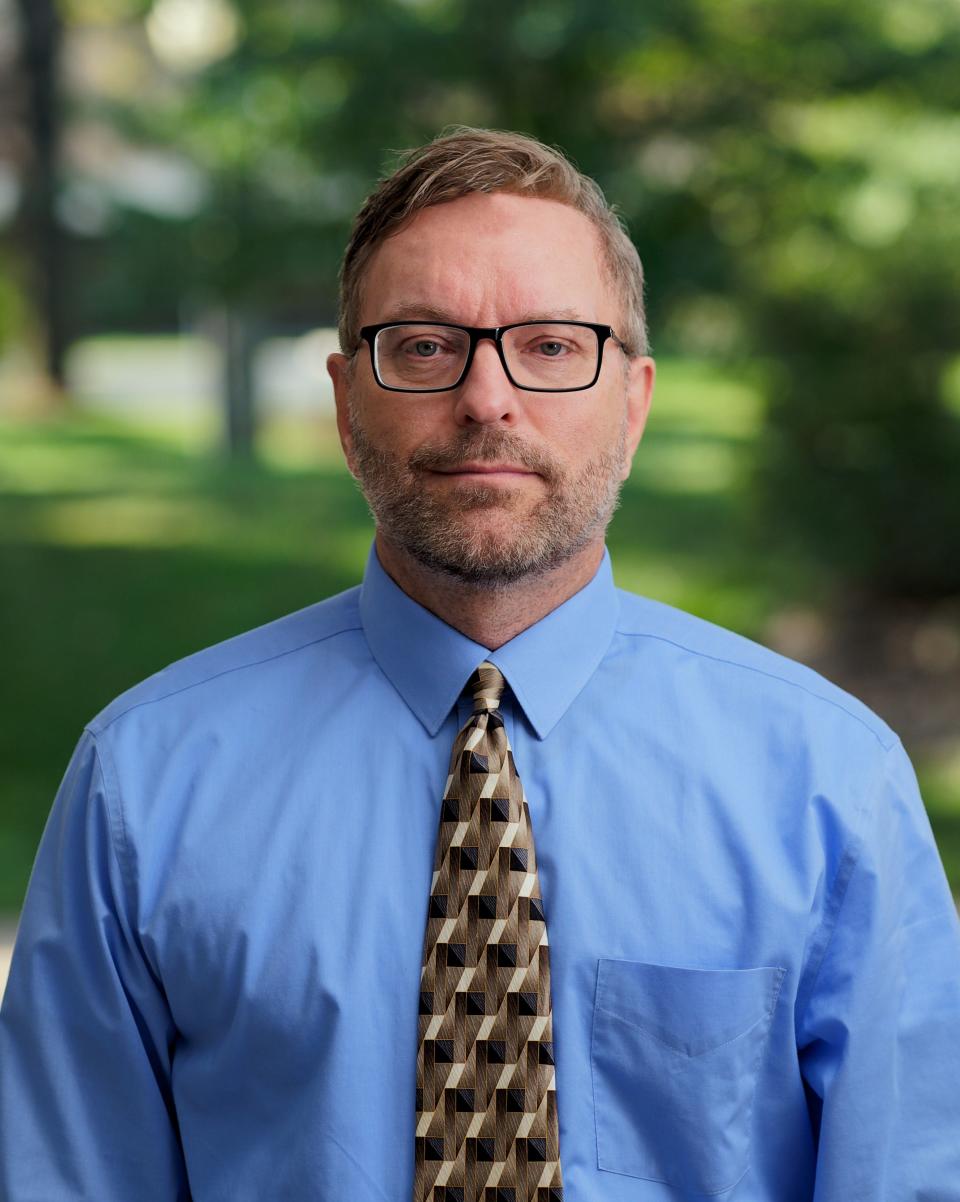
Coming to terms with his sexuality and locating a community that supported him didn't happen for Wilson overnight. For years, Wilson said he felt a "sense of dread" when thinking about his future as a gay man.
Growing up, Wilson regularly attended church with his family, which he enjoyed. But he often found himself confused during worship as the pastor read what Wilson described as "clobber passages," six passages from the Bible that are often interpreted as against same-sex relations. These passages include Genesis 19:1-38; Leviticus 18:22, 20:13; Romans 1:25-27; 1 Corinthians 6:9-11; 1 Timothy 1:9-10 and Jude 6-7, according to Outreach, an online resource for the LGBTQ Catholic community.
On top of what Wilson digested at church, his father was also openly prejudiced against the LGBTQ community.
"He often said, 'I don't want a queer within a mile of me.' That's an exact quote," Wilson said. "And there I was, his son, within a few feet of him."
Upon graduating high school in 1983, Wilson was interested in pursuing teaching but decided to work at Walmart instead. Wilson said this decision was based on reading stories about legislation like The Briggs Initiative, which proposed that members of the LGBTQ community could not be educators in the state of California. In 1978, Californians voted against the initiative. Despite this, Wilson said he was still uncertain of what a career in education would look like for him.
Finding community in Cape Girardeau
After two and a half years at Walmart, Wilson realized he wanted something more, so he began taking classes at Mineral Area College, a community college in Park Hills, Missouri, where he teaches today. He then transferred to Southeast Missouri State University in Cape Girardeau. It was at SEMO that Wilson connected with other members of the LGBTQ community for the first time.
In 1989, just a year before Wilson graduated college, he stumbled across a full-page advertisement in the student newspaper, The Capaha Arrow (now just The Arrow), for the Gay and Lesbian Student Association.
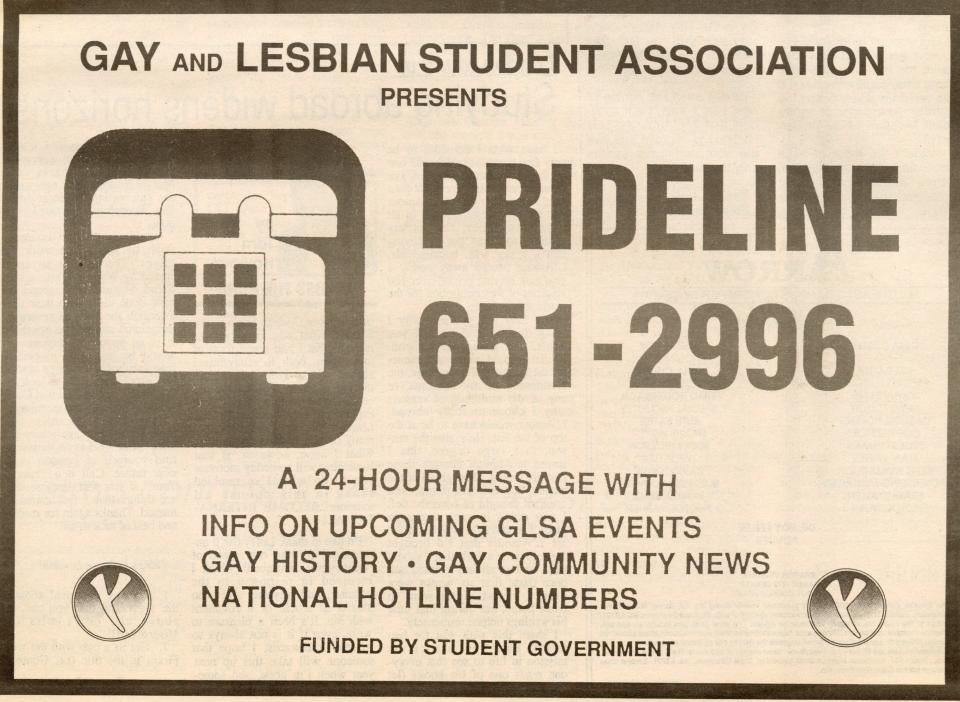
"This was like lightning came off the page," Wilson said about the advertisement. He wrote a letter to the organization and soon met with the GLSA's sponsor.
Johnda Boyce, an attorney in Kansas City, was a member of GLSA when Wilson sent in his letter with interest in joining the organization. At the time, Wilson was in his mid-20s, a few years older than most of the students in the organization.
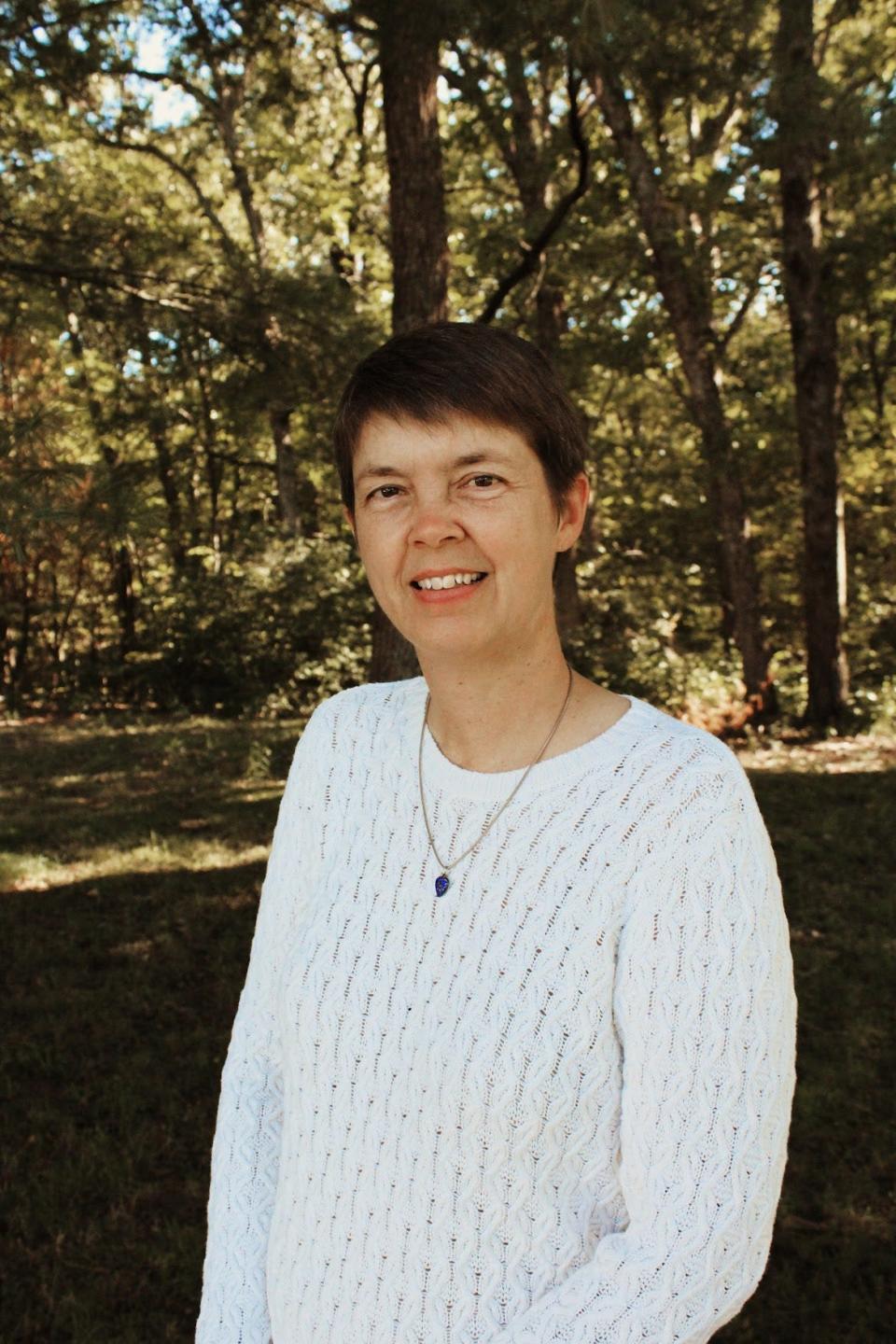
"He contacted us, that he would like to meet with somebody from the group and eventually that was me," Boyce said. "At first we sent our faculty advisor because we were a little afraid of this strange message ... because ... people were hateful, as they continue to be to this day, it could be a setup. Once he was vetted, we were happy to embrace him."
Boyce said Wilson was active in the organization from the start but initially wanted to remain more private with his participation, as he was not out to all of his family. Over time, he became more vocal and publicly visible. Wilson and Boyce often wrote letters to The Capaha Arrow in response to national, statewide and local discourse against the LGBTQ community.
"We were young and not very powerful and powerful people were attacking our organization," Boyce said.
Developing LGBT History Month
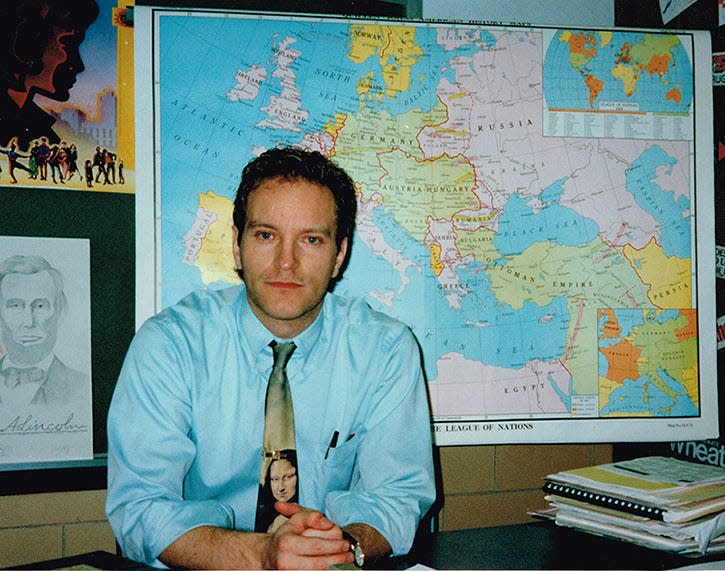
After SEMO, Wilson began teaching as a high school social studies teacher in the Mehlville R-IX School District in southern St. Louis. He taught there between 1990 and 1997. It was during this time he began drafting up a proposal for LGBT History Month.
In January 1994, Wilson wrote up his initial two-page proposal, outlining what a history month is and does, with references to Black History Month and Women's History Month, and why the LGBTQ community needed its own history month. One of the first people Wilson had read over the proposal was Boyce.
"I thought it was an amazing idea," said Boyce, who at the time was a graduate student at Ohio State University pursuing a degree in women's studies.
With a finalized proposal, Wilson and a council of individuals who supported it, including Boyce, began mailing it to every LGBTQ organization they could think of. Some of the first Wilson reached out to and heard back from included GLAAD, the Humans Right Campaign and individuals like educator, historian and LGBTQ activist Martin Duberman.
During the first year, the Gerber/Hart Library and Archives in Chicago served as the "institutional home" for LGBT History Month. The second year was GLSEN and then GLAAD took over in the late '90s, Wilson said. In 2006, Equality Forum became the official home and has been managing the history month since.
For the past 17 years, Equality Forum has published a list of 31 different LGBTQ icons, one each day throughout October. This year's list includes the late actor Leslie Jordan, WNBA player Brittney Griner, British comedian Eddie Izzard and R.E.M. lead vocalist Michael Stipe.
Although LGBT History Month is now managed by Equality Forum, Wilson still plays a big role in its development. He helped form an international committee that works to create LGBT History Months across the world.
As of 2022, 19 regions celebrate LGBT History Month. These include the United States, United Kingdom, Scotland, Wales, Romania, Hungary, Berlin, Australia, the Nordic region, Northern Ireland, Canada, Finland, Armenia, the Southeast Asian region, Netherlands, Italy, Cuba, Francophone and Uganda. Wilson said the committee is also working with leaders in Poland, Spain and Venezuela to establish LGBT History Months.
Making national headlines
Today, Wilson is popularly recognized for establishing LGBT History Month. But in 1994, he was known for something else: being the first openly gay teacher at the Mehlville R-IX School District.
"I decided to do that because I had to," Wilson said of his coming out. "I couldn't have one area of my life — a huge area, employment, my career — I couldn't have an area of my life compartmentalized and segregated from the rest of my being."
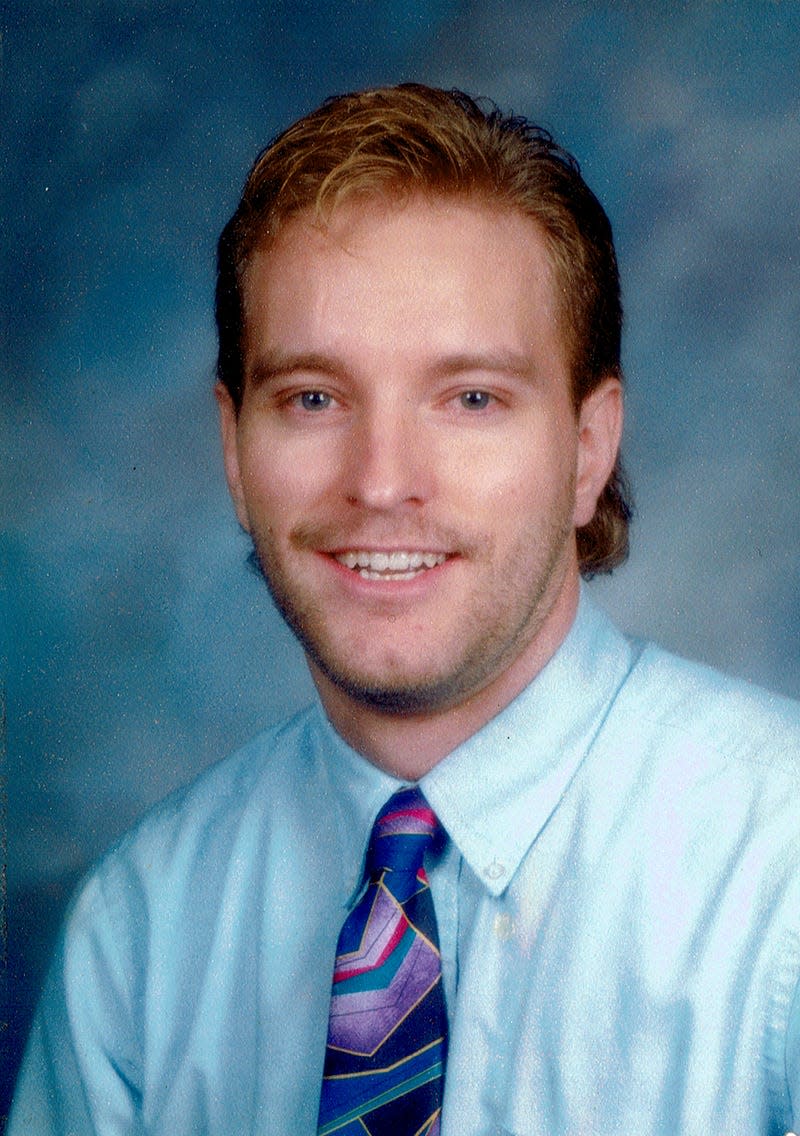
Wilson said at the time, there were about 110 teachers and 2,000 students at Mehlville High School, grades 9-12. About 15% of the students at the high school were Black, and Wilson recalled only two Black teachers in the entire high school. Diverse representation was ultimately something the district lacked.
It was during the spring semester in 1994 when Wilson came out to one of his social studies classes. He was teaching his students about the different classification symbols prisoners in Nazi concentration camps were forced to wear during World War II. One of these symbols was a pink triangle, used to classify homosexuals.
"He just kind of casually slipped it in there that had he been in that vicinity at the time, he would have been branded with that patch (the pink triangle) and then kind of paused and let that sink in for a moment," Dana Workes, one of the students in Wilson's class at the time, recalled in the documentary, "Taboo Teaching: A Profile of Missouri Teacher Rodney Wilson."
Sarah Hirning Reece, another one of Wilson's students featured in the documentary, described the moment as "earth-shattering," because she felt like she knew Wilson.
What followed was a whirlwind of news coverage and backlash from the Mehlville R-IX School District community, specifically parents. Many believed discussions of homosexuality should not be allowed in the school setting and wished for Wilson to be fired.
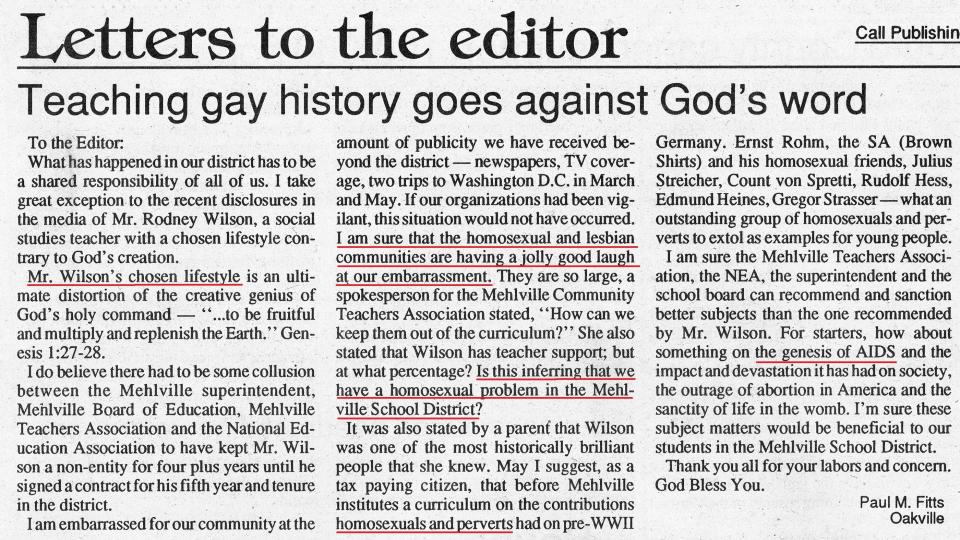
Publications like The Riverfront Times and Teacher Magazine ran cover stories about Wilson. Television talking heads debated whether Wilson's actions were right and wrong and he made an appearance on "Dateline" to discuss his decision.
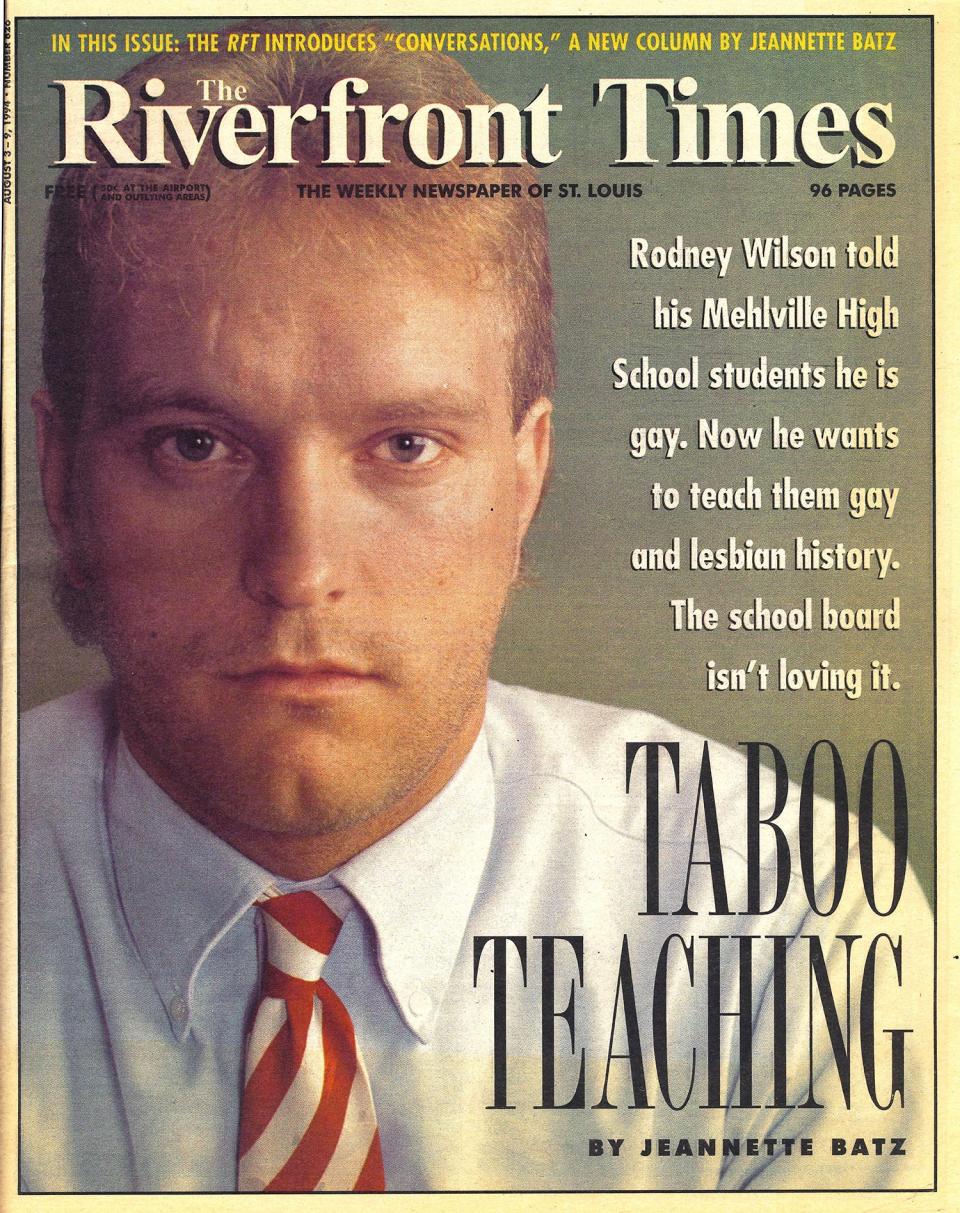
Despite what some community members thought, Wilson continued to teach at the school district and was granted tenure. Wilson said he thinks this proved to be a powerful message for the LGBTQ community, specifically LGBTQ youth.
"It would be one of the most important lessons I ever taught," Wilson said about his coming out. "I still think, in my 34 years of education, that's the most important lesson I ever taught ... was being an openly gay teacher in a school that year, the following year, being granted tenure ... before on my own volition I opted to go do something else and live somewhere else. It was on my terms."
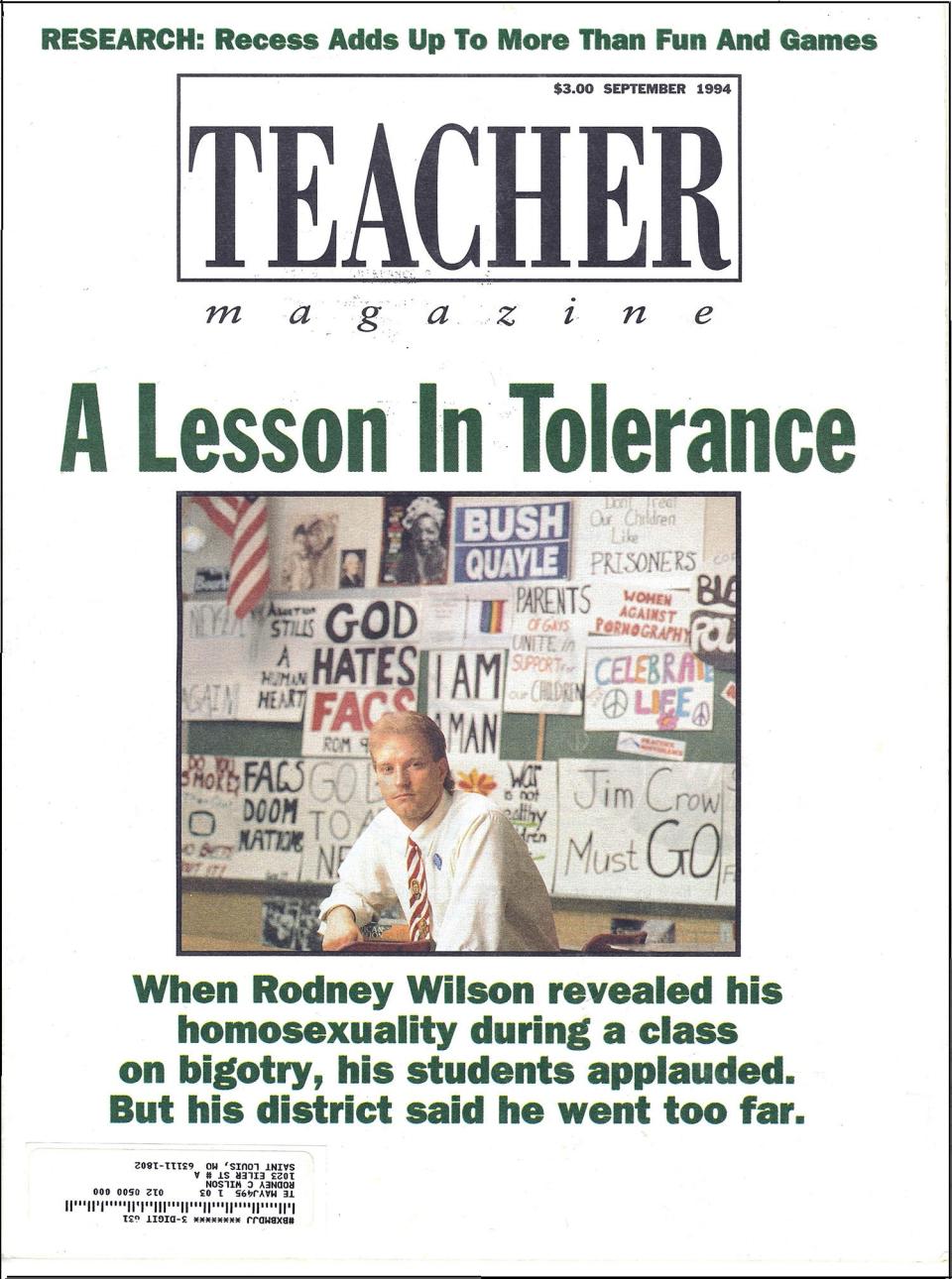
At the time, Reece didn't understand why Wilson shared this information with the class, but today, as an educator at the Mehlville High School herself, Reece said she is glad he did.
"I remember being pretty adamant about what I believed at the time and writing something in a paper at the end of the school year like, 'You know this is what the Bible says,'" Reece said in the documentary. "I know about five years ago (now eight years), I sent Rodney a message and just said, 'I'm really sorry because I don't believe that anymore.' It was something that weighed on me for a really long time."
Facing and fighting the turbulence
As someone who has been advocating for the LGBTQ community for decades, Wilson said he finds recent anti-LGBTQ legislation, like Missouri's bans on both gender-affirming health care and prohibitions against transgender girls and women participating in female sports, "disappointing," "distressing" and "disturbing."
"I can understand why people get confused or they don't understand what's going on or they haven't educated themselves yet," Wilson said. "Seek out education. Try to understand. Try to learn. I say to people, five to 10 years ago I started seeing the word 'cisgender.' I didn't know what it meant. I looked it up: 'Oh, that's who I am. I didn't know there was a name for who I am. That's cool.' There's a lot of good people who don't know everything and have misunderstandings. That's okay as long as they are seeking out information."
Despite current hardships, Boyce encouraged members of the LGBTQ community and their allies to recognize progress made.
"All of those things are not eroded by this current situation," Boyce said. "I never thought there would be legalized same-sex marriage in my lifetime. I just never thought that a few years ago that would become the law of the land through a Supreme Court decision. We can use those gains and the increased visibility ... to create this outcry and protect people."
Resources about LGBTQ history
During this year's LGBT History Month, Boyce encouraged folks to educate themselves on the history of the LGBTQ movement itself. The following online resources serve as good points of entry for learning more:
Smithsonian National Museum of American History: Archival access to the Smithsonian's LGBTQ History collection and videos highlighting key events in LGBT history
PFLAG: Access to articles, podcasts, films and books on LGBT history
GLSEN: Interactive, multimedia resources, including podcast episodes, coloring books and educational lesson plans
GLAAD: Interactive timeline on the history of GLAAD, a non-profit organization dedicated to LGBTQ advocacy
Stonewall: Comprehensive research on the Stonewall Uprising and its effects on the community
LGBTQ History: Definitions, historical timelines and lesson plans for educating about LGBTQ history
Greta Cross is the trending topics reporter for the Springfield News-Leader. Follow her on X and Instagram @gretacrossphoto. Story idea? Email her at gcross@gannett.com.
This article originally appeared on Springfield News-Leader: Over 25 years later, roots of LGBT History Month remain in Missouri

